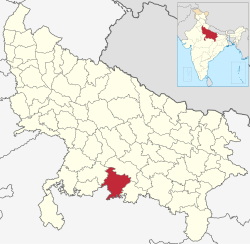Banda district
|
Banda district बांदा जनपद باندہ ضلع |
|
|---|---|
| District of Uttar Pradesh | |
 Location of Banda district in Uttar Pradesh |
|
| Country | India |
| State | Uttar Pradesh |
| Administrative division | Chitrakoot |
| Headquarters | Banda |
| Government | |
| • Lok Sabha constituencies | Banda |
| Area | |
| • Total | 4,413 km2 (1,704 sq mi) |
| Population (2011) | |
| • Total | 1,799,541 |
| • Density | 410/km2 (1,100/sq mi) |
| Demographics | |
| • Literacy | 68.11 per cent |
| • Sex ratio | 863 |
| Website | Official website |
Banda district is a district of Uttar Pradesh state of India, and Banda is the district headquarters. It is a part of Chitrakoot Division.
Banda is famous for its Shajar stone, used for making jewellery, and the historically and architecturally significant sites Khajuraho and Kalinjar. Khajuraho is a World Heritage Site famous for its elaborately carved temples. The fortress of Kalinjar is famed for its war history and its glorious rock sculptures.
In 1998, the tehsils of Karwi and Mau, formerly part of Banda District, became the new Chitrakoot District. Banda was a town and district of British India, in the Allahabad division of the United Provinces. The population in 1901 was 22,565. It was formerly, but is no longer, a military cantonment.
The district largely consists of irregular uplands with outcrops of rocks intermingling with lowlands, which are frequently under water during the rainy season. The Baghein River traverses the district from south-west to north-east. Other important rivers are the Ken River in the east and the Yamuna to the north. The dominant communities of this area are of Kshatriyas, Patels, Chandrauls, Chandelas, Bundelas etc.
The economy is predominantly agricultural, with the main crops being paddy rice, wheat and vegetables.
In 2006 the Ministry of Panchayati Raj named Banda one of the country's 250 most backward districts (out of a total of 640). It is one of the 34 districts in Uttar Pradesh currently receiving funds from the Backward Regions Grant Fund Programme (BRGF).
...
Wikipedia
